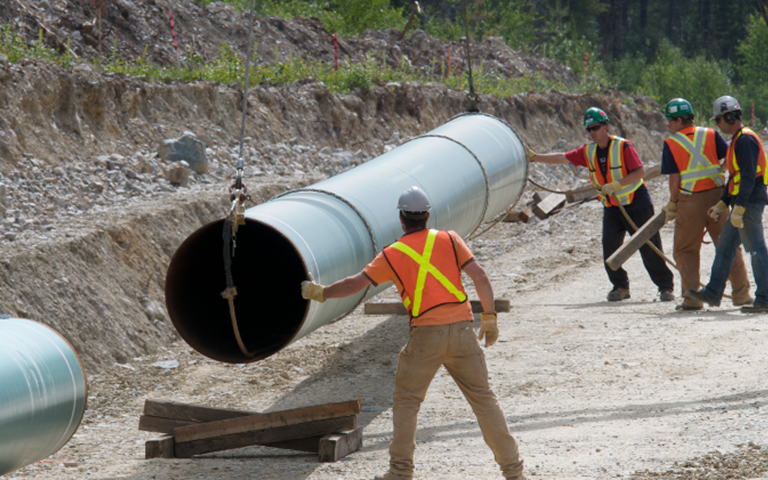The construction season on the Trans Mountain expansion is expected to begin this week, Finance Minister Bill Morneau said Tuesday. Courtesy of the Trans Mountain Expansion Project
Canada will buy the Trans Mountain expansion project from Kinder Morgan for $4.5 billion, including the existing pipeline, and sell it to another investor, federal Finance Minister Bill Morneau and Natural Resources Minister Jim Carr announced Tuesday morning.
The announcement came two days before Kinder Morgan’s May 31 deadline to abandon the project if certain agreements were not met.
"Make no mistake, this is an investment in Canada's future," Morneau said.
The $4.5 billion covers the sale of Kinder Morgan's physical assets – the existing pipeline and terminals – and the investment in the expansion. It has also taken on an existing leadership team from Kinder Morgan to work on the construction this summer. After the sale is complete, which is expected in the third or fourth quarter of this year, the government will finish construction on its own.
Morneau did not specify what he expected construction to cost. Kinder Morgan has pegged the cost of the expansion project at $7.4 billion.
Until a buyer is found, a new crown corporation will manage the project. Kinder Morgan will help the government find a buyer until July 22.
Kinder Morgan CEO Steve Kean said on a Tuesday morning conference call that the company had "agreed to a fair price for our shareholders, and...found a way forward for this national interest project."
Morneau said the federal government has had “multiple investors” express interest in taking over the project, but does not have a target date in selling it back to the private sector and is focusing on getting construction started.
Ottawa will extend the federal indemnity it had previously promised to Kinder Morgan to any new investor in the project, to ensure it gets built. The Alberta government will also help to cover any “extraordinary costs” from construction and will receive “value commensurate with their contribution,” Morneau said.
Related: Alberta raises the stakes in dispute with B.C. over pipeline expansion
The sale is still subject to the approval of Kinder Morgan's shareholders.
Canadian Association of Petroleum Producers president and CEO Tim McMillan said the federal government "has clearly made a long-term commitment to the oil and natural gas industry." But he added that he hoped this would be an exceptional circumstance. "The situation shouldn't have come to this."
The controversial project, which would nearly triple the Edmonton-to-Burnaby pipeline’s capacity to 890,000 barrels per day of oil, up from 300,000 currently, has been beset by delays from British Columbia’s NDP government, which has promised to use “every tool available” to fight the project. Most recently, it proposed regulations to restrict the flow of diluted bitumen through the pipeline until it can study whether spills could be safely cleaned up.
“What we have here is risks and delays caused by political uncertainty,” Morneau said. “A private actor can’t deal with that uncertainty between provinces.”
Morneau said because the pipeline crosses provincial barriers the federal government has jurisdiction over it. “We’re exerting our federal jurisdiction by purchasing the project,” he said.
Alberta Premier Rachel Notley cheered the development, calling it "a major step forward for Albertans and for all Canadians."
At a news conference in front of the Alberta legislature, Notley said the pipeline will "unlock investment in our oil sands because we are now on the path to getting full value for our energy resources."
British Columbia Premier John Horgan said the federal government's decision to buy the project did not change his concerns. "The federal government has been abundantly clear they believe this project is in the national interest. They haven't defined that," he said. "I've been making the case that there's a high degree of risk for British Columbia, a high degree of risk for our coast, which belongs to all Canadians."
The expansion project is the subject of multiple ongoing lawsuits. A series of challenges filed by First Nations, environmental groups and the cities of Burnaby and Vancouver were amalgamated into one court action, which the B.C. government is now an intervener in.
The Federal Court of Appeal declined to hear cases from the B.C. government and the City of Burnaby appealing a National Energy Board decision allowing Kinder Morgan to bypass local construction bylaws. Burnaby has applied for an appeal at the Supreme Court of Canada.
The B.C. government has also filed a constitutional reference question with the B.C. Court of Appeal, asking if it can require companies to get provincial permission before increasing bitumen flow through pipelines, which would give the province veto power if it was able to do so.
Two legal challenges to the project, from the City of Vancouver and the Squamish Nation, that argued the province of British Columbia had failed to engage in proper consultation and had not conducted a proper environmental assessment were dismissed by a B.C. Supreme Court judge on May 24.
With files from Kevin Martine



